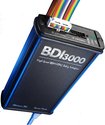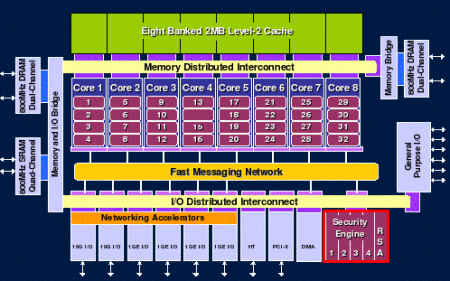Debugger supports multi-core MIP64 chips
Oct 9, 2008 — by Eric Brown — from the LinuxDevices Archive — 1 views Abatron announced that its Linux-friendly hardware debug probe now supports the on-chip debug interfaces in the newest multi-core, multi-threaded MIPS64 chips from Raza Microelectronics, Inc. (RMI). Specifically, the Abatron BDI3000 probe and associated debugging applications now supports RMI's XLR and XLS system-on-chip (SoC) families, Abatron said.
Abatron announced that its Linux-friendly hardware debug probe now supports the on-chip debug interfaces in the newest multi-core, multi-threaded MIPS64 chips from Raza Microelectronics, Inc. (RMI). Specifically, the Abatron BDI3000 probe and associated debugging applications now supports RMI's XLR and XLS system-on-chip (SoC) families, Abatron said.
(Click for larger view of the BDI3000 probe)
The BDI3000 is suitable for low-level hardware development, Linux kernel development, and in-circuit flash programming on the XLR/XLS platform, says Abatron. The Swiss firm announced its BDI3000 probe in January, and in July announced that the probe supported the Cavium Octeon multi-core SoCs, which integrate up to 16 MIPS64 cores.


Target and host ends of the BDI3000
Abatron's probes support JTAG debugging as well as “background debugging mode” (BDM), which exploits the on-chip debugging capabilities within many modern processors. BDM debugging sessions are said to be able to survive target system crashes, thereby facilitating crash forensics. Software options for the probes include the commercial, Eclipse-based Linuxscope-JTD (JTAG target debugger).
Compared to the BDI2000, which has long been popular among embedded Linux developers, especially for low-level bootloader, board-support, and kernel development, the BDI3000 supports lower target voltages, claims Abatron. The probe also offers a faster 10/100 Ethernet interface of up to 32Mbps, with flash programming speeds boosted to 32MHz, and download speeds increasing to as much as 1.5Mbps, claims the company. The BDI3000 previously supported JTAG debugging for AMCC's PowerPC 405 and 440 processors, as well as ARM, XScale, and MIPS32 architectures.

RMI's XLR architecture
RMI describes its XLR chips as general-purpose processors for communications, networking, wireless, and security applications. The SoCs integrate four or eight MIPS64 cores clocked up to 1.5GHz. Each core is said to implement fine-grained, four-way multi-threading, for the equivalent performance of 16 or 32 separate cores. In April, Wind River ported its Carrier Grade Linux distribution to the XLR family.
The lower powered, more affordable XLS family, which includes the new XLS208, as well as the XLS 600 and 400 series, is designed primarily for integrated security, access point, router, and switch devices, says RMI. Compared to RMI's earlier XLS204, the XLS208 offers two multi-threaded, MIPS64-compatible cores instead of one, and boosts the clock rate from 750MHz to 1GHz. A Linux-compatible evaluation board and software development kit (SDK) are also available for the SoC.
Stated Mark Litvack, director, business development, RMI, “By [Abatron] providing these tools, our customers will be able to accelerate their development time in bringing multi-services communications platforms to the market.”
Availability
The BDI3000 probe, now supporting the RMI XLR and XLS families, is available from Ultimate Solutions, which claims to be the only stocking distributor of Abatron products in the Americas. Pricing was not disclosed.
This article was originally published on LinuxDevices.com and has been donated to the open source community by QuinStreet Inc. Please visit LinuxToday.com for up-to-date news and articles about Linux and open source.